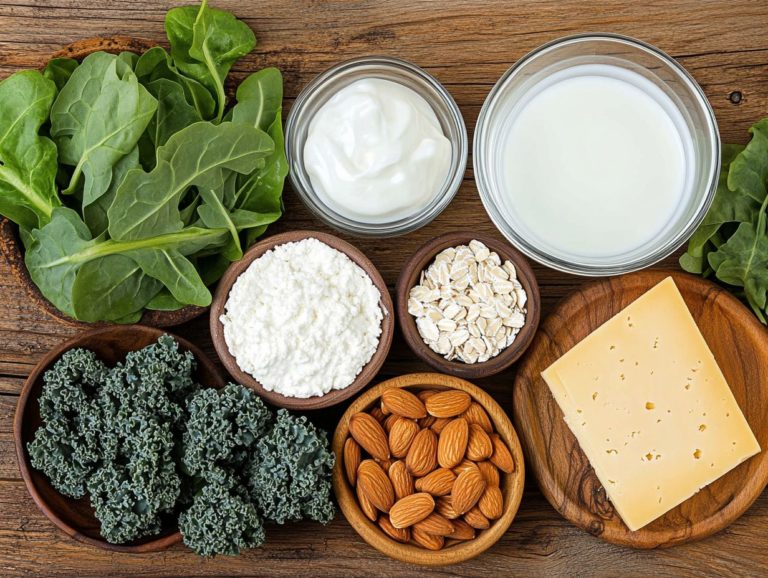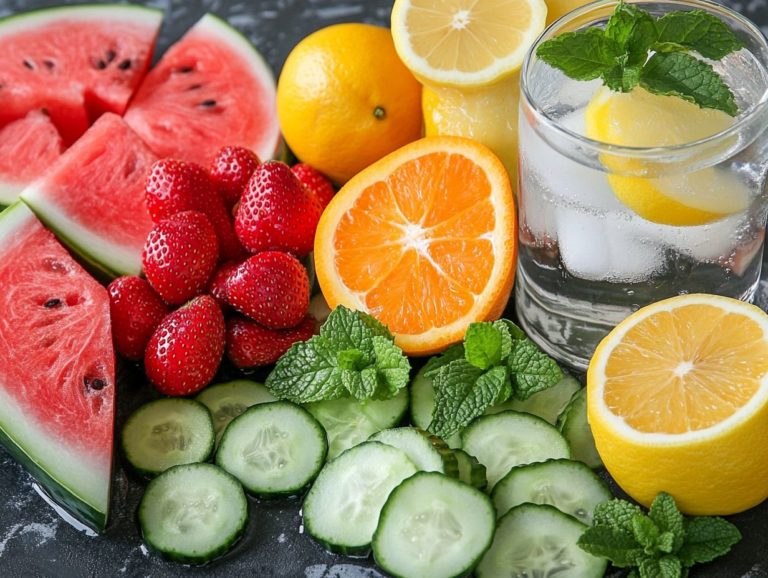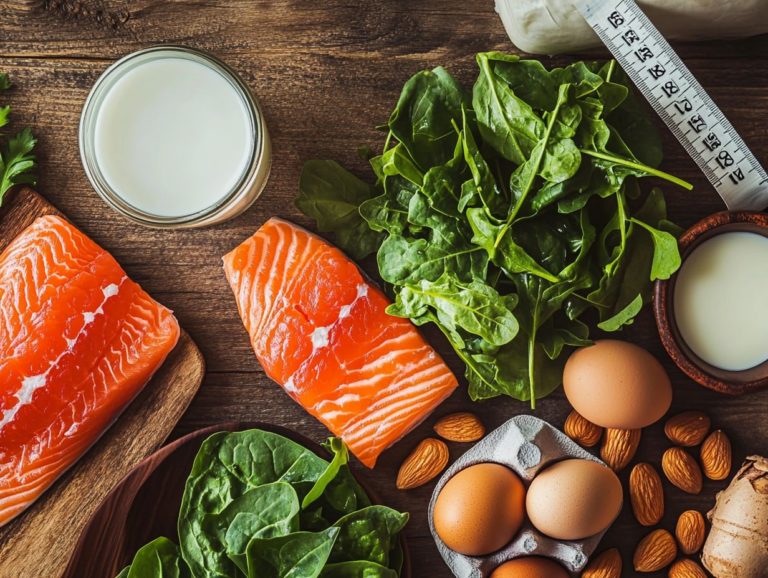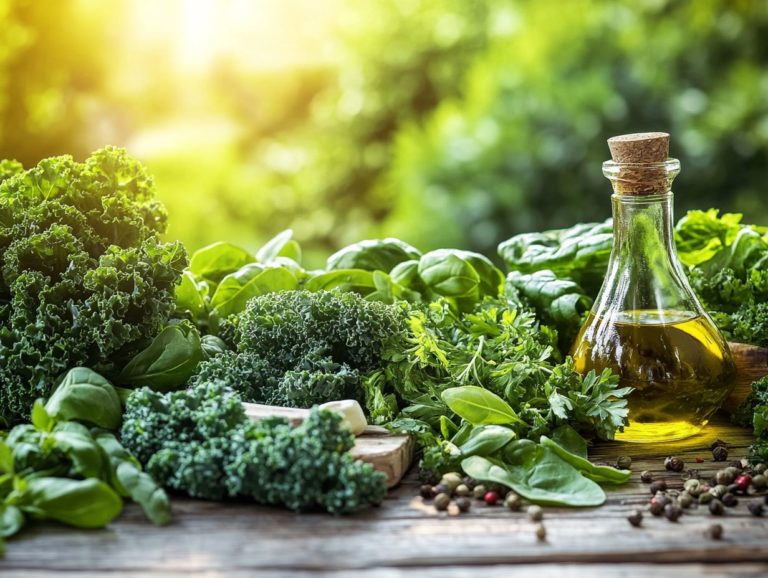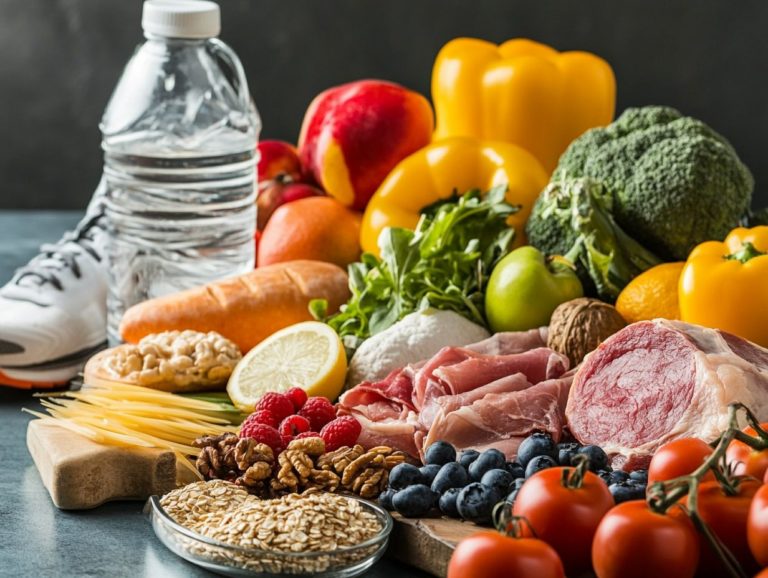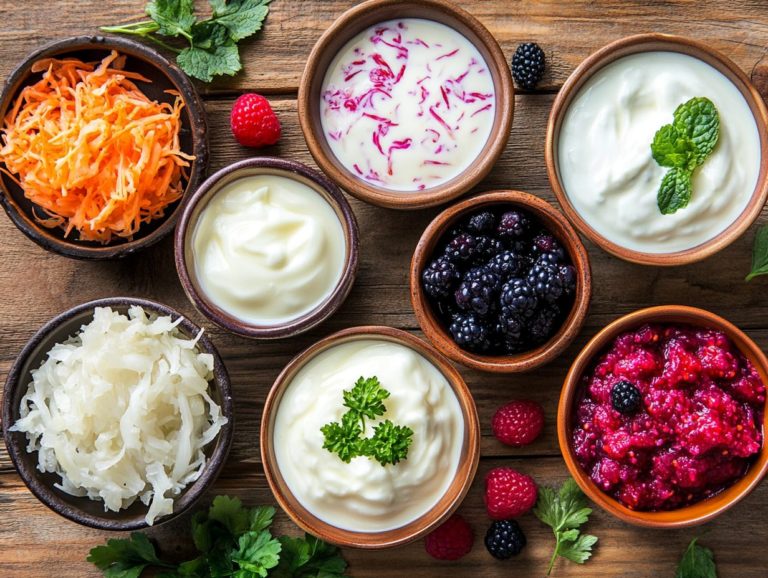Top Sources of Nutrients for Healthy Hair
Healthy hair is a testament to overall well-being, with vibrant locks resting firmly on proper nutrition.
In this article, discover the essential vitamins and minerals that promote hair growth and enhance strength. Learn about the best food sources to meet those nutritional needs.
This discussion highlights the vital role of hydration in maintaining hair health, offering practical tips for incorporating nutrient-rich foods into your daily diet.
Unlock the secrets to achieving luscious hair through the transformative power of nutrition!
Contents
- Key Takeaways:
- Essential Nutrients for Healthy Hair
- Best Food Sources for Hair-Nourishing Nutrients
- The Role of Hydration in Hair Health
- Incorporating Nutrient-Rich Foods into Your Diet
- Frequently Asked Questions
- What are the top sources of nutrients for healthy hair?
- How do proteins benefit hair health?
- Why is iron important for maintaining healthy hair?
- What role does biotin play in hair health?
- How do omega-3 fatty acids contribute to healthy hair?
- Which fruits and vegetables are top sources of nutrients for healthy hair?
Key Takeaways:
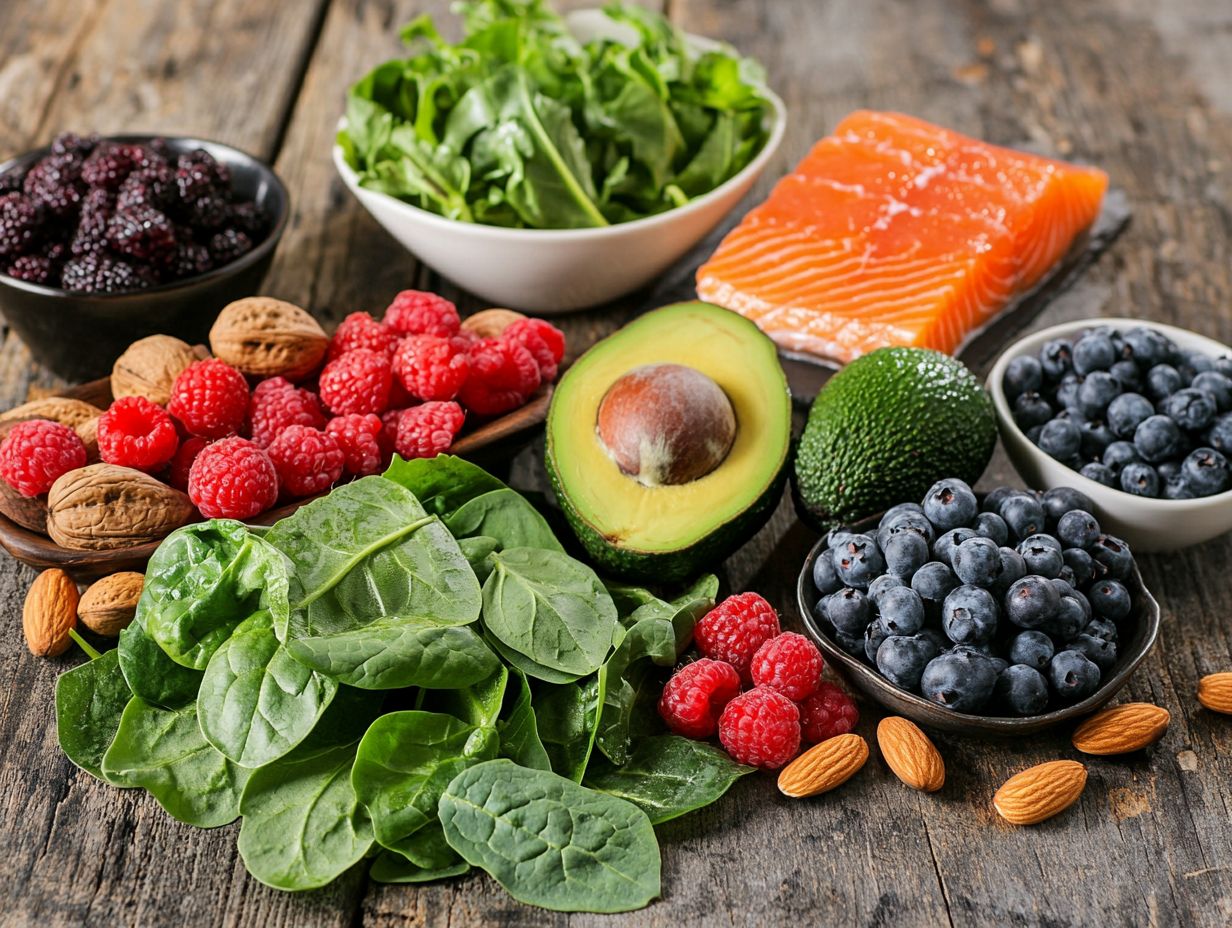
- Proper nutrition is crucial for healthy hair, as essential nutrients support hair growth and strength.
- Vitamins and minerals are key nutrients for promoting healthy hair, with vitamin A and iron playing important roles.
- Incorporating a variety of vitamin-rich and mineral-rich foods, along with staying hydrated, nourishes and promotes healthy hair.
The Importance of Proper Nutrition for Hair Health
Proper nutrition is key to maintaining healthy hair, profoundly influencing your growth cycle, quality, and scalp health. A balanced, nutrient-rich diet is essential for promoting strong hair follicles and preventing hair loss.
Key nutrients including essential vitamins, minerals, and dietary fats determine hair texture, thickness, and overall appearance, ensuring vibrancy and strength. Understanding the importance of a healthy diet can empower you to achieve optimal hair health.
Specific vitamins, such as A, C, D, and E, are crucial for hair vitality. Vitamin A encourages sebum production to keep hair moisturized. Vitamin C aids in collagen production, essential for strong strands. Vitamin D helps create new hair follicles, while vitamin E improves blood circulation to the scalp.
Along with vitamins, minerals like zinc and iron are critical; zinc deficiency can lead to hair loss, while iron transports oxygen to hair follicles. Selenium acts as a powerful antioxidant, protecting your hair from damage caused by harmful molecules.
Incorporating nutrient-rich foods like leafy greens, nuts, and lean proteins into your diet can significantly enhance hair health.
Essential Nutrients for Healthy Hair
Essential nutrients for healthy hair encompass vitamins and minerals that promote growth and elevate the quality of your tresses.
Key vitamins like biotin, vitamin C, and vitamin E are critical for maintaining vibrant hair. Minerals such as zinc, selenium, and iron nourish hair and prevent deficiencies that could lead to hair loss.
By including protein-rich foods and omega-3 fatty acids in your diet, you provide the amino acids required for optimal hair structure, ensuring resilience and peak condition.
Vitamins for Hair Growth and Strength
Vitamins play a crucial role in enhancing hair growth and strength by delivering essential nutrients for the hair cycle and scalp health. Key vitamins like biotin, vitamin C, and vitamin E improve hair quality, while vitamins A and D maintain healthy hair follicles and prevent hair loss.
The antioxidant properties of these vitamins combat oxidative stress, ensuring your hair remains resilient and vibrant throughout its growth journey.
Biotin, often called the “hair vitamin,” fortifies keratin structures and is abundant in foods like eggs and nuts. Vitamin C boosts collagen production, vital for sustaining hair structure; citrus fruits and bell peppers are great sources.
Vitamin E enhances blood circulation to the scalp and can be found in avocados and almonds. Meanwhile, vitamin A promotes sebum production, keeping your scalp moisturized think sweet potatoes and dark leafy greens as your go-tos.
Don’t forget vitamin D, which stimulates hair follicles; you can get it from fatty fish and mushrooms. By incorporating these vitamin-rich foods into your daily meals, boost your hair’s vitality today!
Minerals for Hair Health
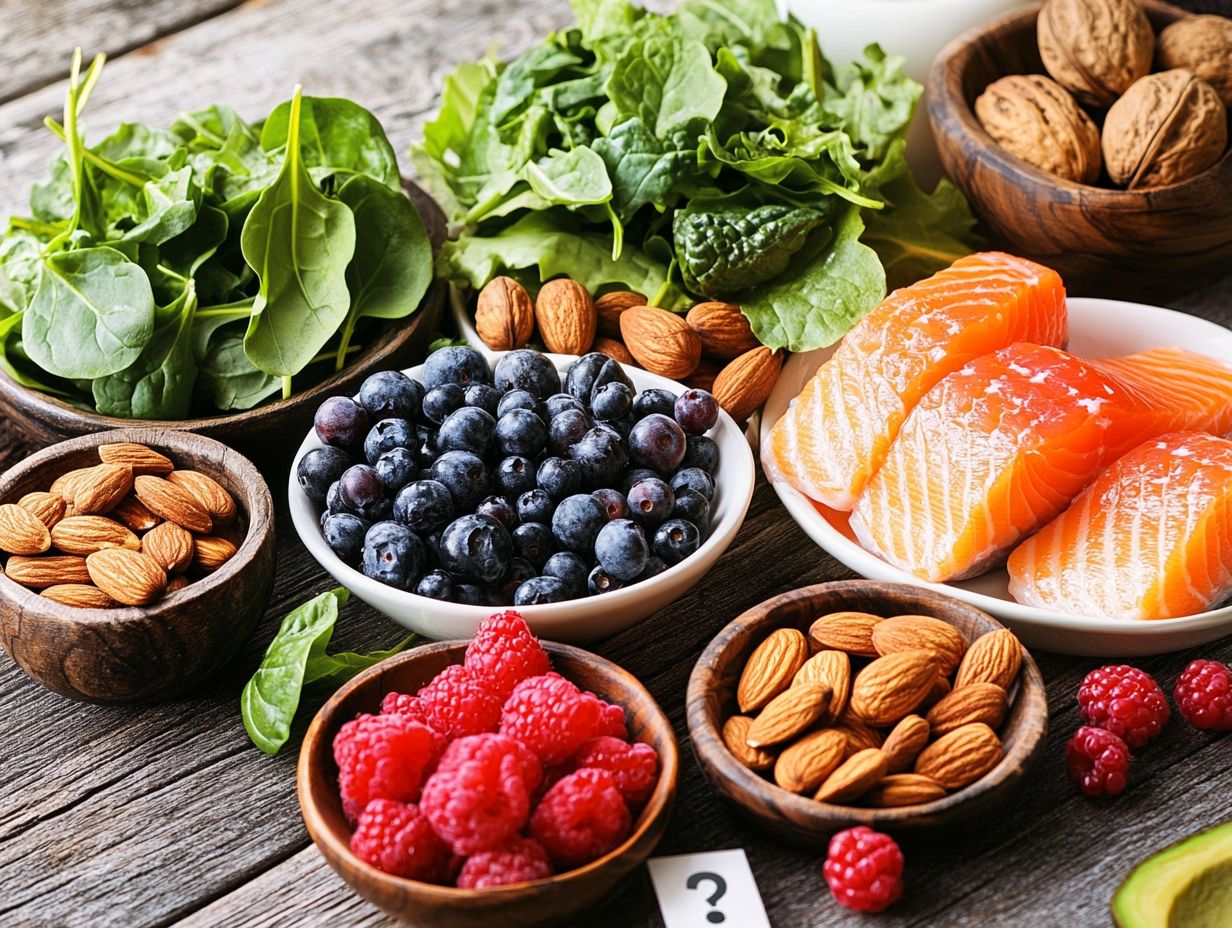
Minerals are essential for hair health. They provide vital support that hair follicles need and significantly influence growth and quality.
Take zinc; it s important for protein synthesis and cell turnover. Selenium acts as an antioxidant, ensuring your hair remains strong and vibrant.
Iron is also crucial as it transports oxygen to your hair cells, promoting healthy growth. If you’re low on iron, you might feel fatigued and notice your hair thinning out.
If you’re looking to boost your iron intake, consider adding these foods to your plate:
- Spinach
- Lentils
- Lean meats
Don t forget about magnesium. It helps regulate calcium levels and prevents damage to hair follicles. Foods like nuts, whole grains, and leafy greens are fantastic options for upping your magnesium intake.
Excited to boost your hair health? Incorporate these minerals into your diet to nourish your hair and maintain its overall health!
Best Food Sources for Hair-Nourishing Nutrients
Incorporating a diverse array of food sources into your diet is crucial for supplying the necessary nutrients that nourish and promote hair growth.
Protein-rich foods, like lean meats, legumes, and dairy, deliver essential amino acids that reinforce hair structure. Omega-3 fatty acids found in fatty fish and walnuts enhance scalp health and help reduce inflammation.
Iron-rich options, such as spinach and lentils, along with zinc sources like pumpkin seeds, play a significant role in preventing hair loss and boosting overall hair quality.
These foods are not just beneficial; they are vital components of a healthful diet!
Top Foods for Vitamin-Rich Diets
Maintaining a vitamin-rich diet includes a delightful array of fruits, vegetables, and whole grains, each packed with essential vitamins crucial for hair health.
Incorporating sweet potatoes into your meals is a smart move; they re excellent for boosting your beta-carotene intake, which your body converts to vitamin A, enhancing hair vitality.
Think about whipping up berry smoothies or oatmeal topped with flaxseeds. They deliver omega-3 fatty acids that nourish your scalp.
Legumes like lentils and chickpeas are your go-to for biotin this vitamin strengthens hair and reduces breakage. Whole grains, like quinoa, provide necessary B vitamins that improve circulation to the scalp.
Embrace these nutrient-dense foods to significantly elevate the condition and growth of your hair over time!
Mineral-Rich Foods for Hair Health
Incorporating mineral-rich foods into your diet is essential for promoting hair health and preventing a lack of nutrients. Foods high in zinc, like chickpeas and nuts, are vital for supporting follicle health.
Iron-rich options, such as red meat and lentils, are crucial for transporting oxygen to hair roots, promoting optimal growth. Meanwhile, selenium-rich foods, like Brazil nuts and fish, improve hair quality and provide antioxidant benefits that protect follicles from damage.
Ensure a balanced intake of these minerals to elevate your overall nutrition. For example, adding a variety of legumes, seeds, and whole grains to your meals can help meet your zinc needs.
Occasionally enjoying lean meats or plant-based iron sources like spinach and quinoa can effectively satisfy your iron requirements.
Enjoy a handful of nuts or a delicious fish dish several times a week to enrich your diet and contribute to healthier-looking hair. By making conscious choices to include these nutrient-dense foods, you can naturally support hair growth and vitality.
Start your journey to luscious hair today by choosing these nutrient-rich foods!
The Role of Hydration in Hair Health
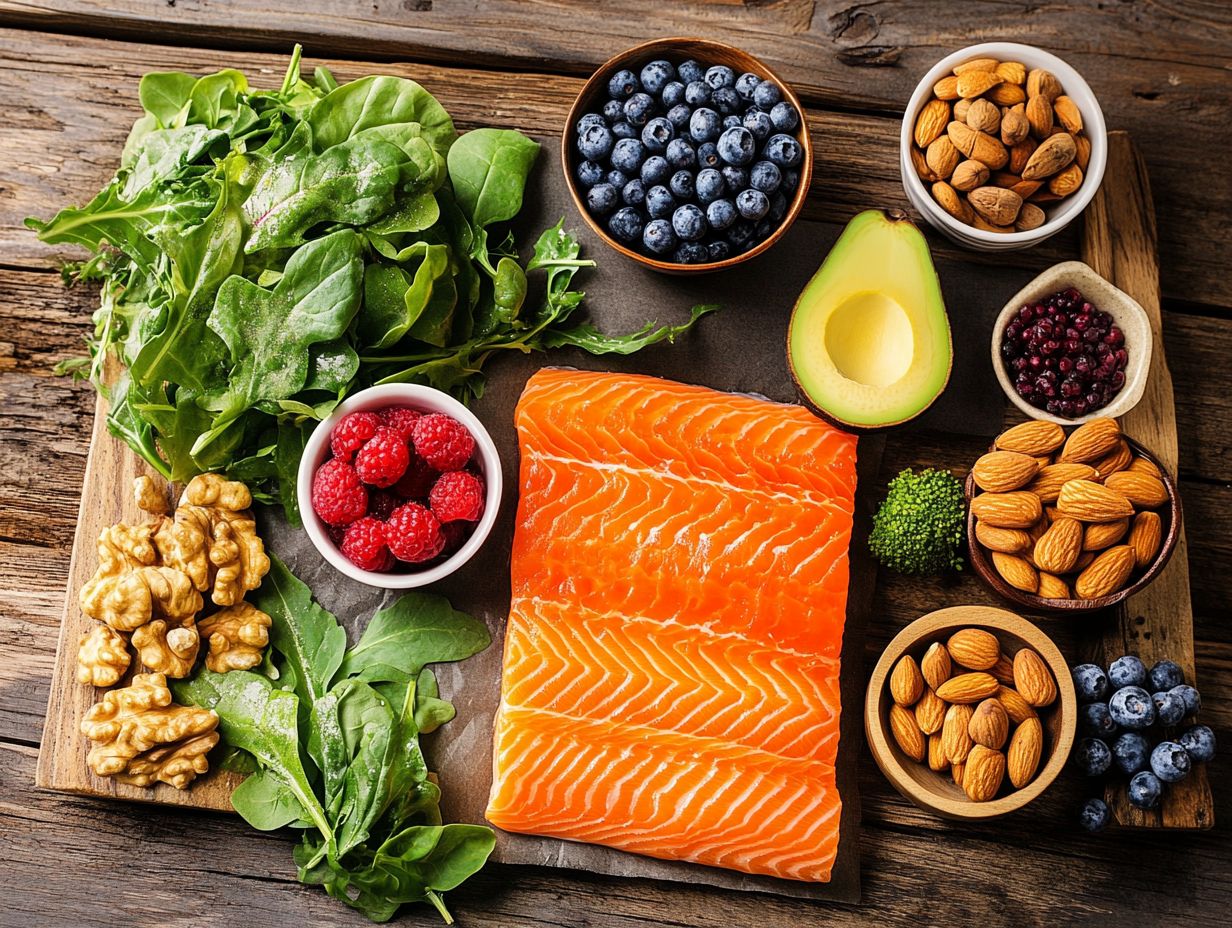
Hydration is crucial for maintaining hair health. Adequate water intake supports scalp health and promotes hair growth, ensuring that your hair follicles receive the moisture and nutrients they need to thrive.
This direct impact on hair quality can significantly enhance your overall appearance. When your body is well-hydrated, it helps fend off dryness and brittleness. This results in stronger, more resilient strands.
So, prioritizing hydration is essential for anyone eager to nourish their hair and boost its growth.
How Water Affects Hair Growth and Appearance
Water intake plays a pivotal role in hair growth and appearance. Proper hydration is essential for delivering nutrients to your hair follicles and maintaining a healthy scalp.
When you re dehydrated, your hair can become dry, brittle, and more susceptible to shedding. This negatively impacts its overall vitality. Staying adequately hydrated keeps your scalp moisturized, reducing the risk of dandruff and creating a healthier environment for hair growth.
Maintaining optimal hydration levels is vital for achieving the best possible hair quality.
When hydration dips, you may find that your hair lacks luster and feels coarse to the touch. Dehydration can lead to several issues, including an itchy, flaky scalp that hinders healthy hair follicles.
Make it a priority to drink at least eight glasses of water daily to keep your hair vibrant and healthy! You can also boost moisture levels by incorporating hydrating foods like cucumbers, oranges, and watermelons into your diet.
Being mindful of factors like excessive sun exposure and dry indoor air can help mitigate the impact of dehydration on your hair health. Remember, hydration is a crucial aspect of any comprehensive hair care routine.
Incorporating Nutrient-Rich Foods into Your Diet
Incorporating nutrient-rich foods into your diet is vital for enhancing hair health and overall well-being. Effective meal planning and preparation can help you achieve this.
By prioritizing fruits, vegetables, whole grains, and lean proteins, you ensure that your body receives the essential vitamins and minerals needed for optimal hair growth and quality.
Following dietary recommendations and heeding nutritionist advice allows you to craft balanced meals that nourish your hair and bolster your overall health.
Smart Strategies for Meal Planning
Meal planning and meal prep are paramount strategies for ensuring you consistently enjoy nutritious meals that bolster your hair health. Dedicating a bit of time each week to organize and prepare your meals in advance helps you effortlessly include a variety of nutrient-rich foods in your diet. This approach frees you from the chaos of last-minute cooking.
Crafting a meal plan that showcases healthy recipes packed with vitamins, minerals, and protein can greatly enhance your chances of meeting your dietary goals and promoting hair growth.
To truly harness the benefits of meal planning, begin with a detailed shopping list that emphasizes seasonal fruits and vegetables. These ingredients are often fresher and more budget-friendly.
Infusing your recipes with these vibrant elements not only elevates the flavor but also enriches your meals with a diverse array of nutrients essential for overall well-being.
Don t underestimate the power of leftovers; they can save time and reduce food waste. For example, transforming roasted vegetables into hearty soups or salads provides delightful options for future meals.
By integrating these strategies into your routine, achieving nutritional balance becomes a more attainable goal.
Frequently Asked Questions
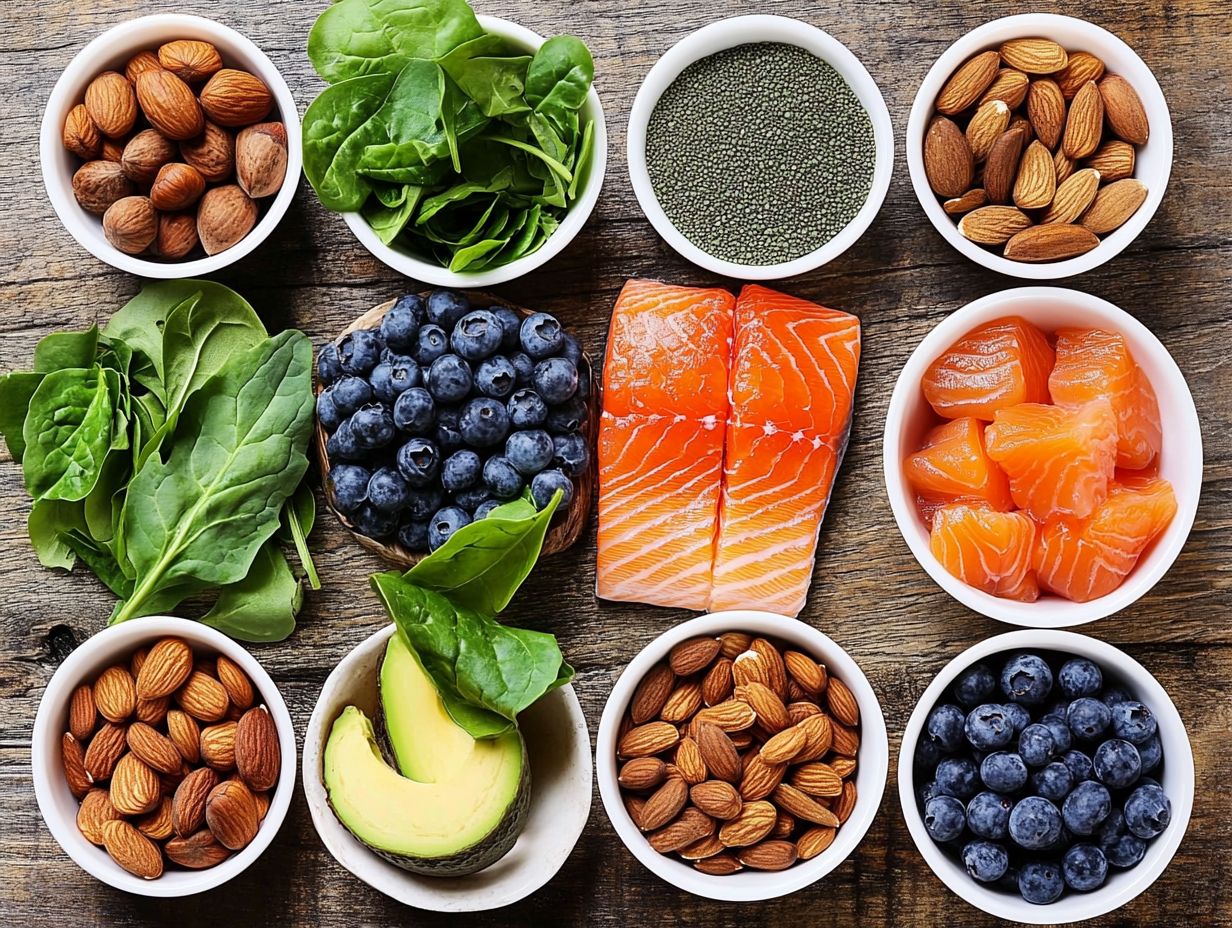
What are the top sources of nutrients for healthy hair?
The top sources of nutrients for healthy hair are proteins, iron, biotin, omega-3 fatty acids, vitamin A, and vitamin C.
How do proteins benefit hair health?
Proteins are essential for healthy hair as they help in the production of keratin, a protein that makes up the structure of hair. They also help in repairing damaged hair and promoting hair growth.
Why is iron important for maintaining healthy hair?
Iron is vital for vibrant hair! It carries oxygen to hair follicles, which promotes growth and helps prevent hair loss.
What role does biotin play in hair health?
Biotin, or vitamin B7, is essential for healthy hair growth. It helps produce keratin and supports the metabolism of amino acids, which build the proteins needed for hair growth.
How do omega-3 fatty acids contribute to healthy hair?
Omega-3 fatty acids nourish hair follicles and stimulate growth. They also keep the scalp hydrated, preventing dryness and brittleness.
Which fruits and vegetables are top sources of nutrients for healthy hair?
Fruits and vegetables like spinach, sweet potatoes, carrots, and citrus fruits are packed with vitamins A and C. These nutrients promote hair growth and enhance texture and strength.

